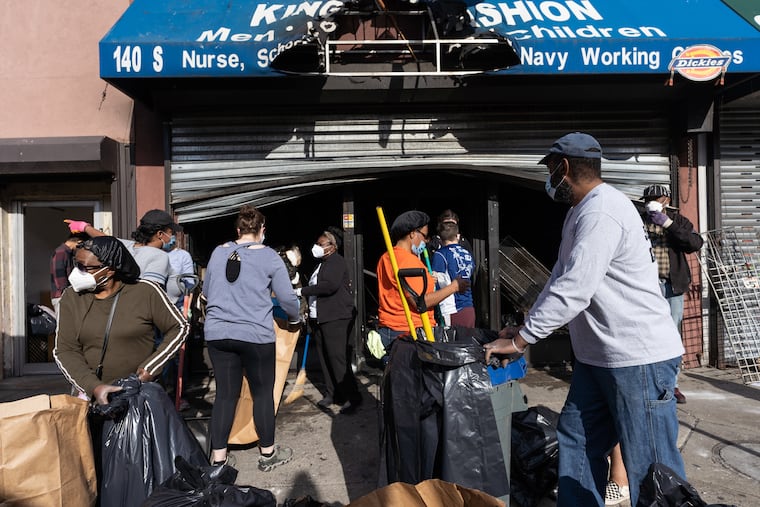I’m a West Philadelphian. The looting is not our biggest problem. | Opinion
Where was this energy of protection for, and investment in, this part of Philly before?

When the protests emerged in Philadelphia after the killing of George Floyd, politicians across the city echoed the need for peaceful demonstrations. This mood was soon disrupted by the eruption of riots, car burnings, and looting in Center City that traveled to West Philadelphia and other parts of the city.
In West Philly, where I’ve organized as a lifelong resident, the developments hit the 52nd Street corridor especially hard. I am empathetic to black businesses on the corridor, where this week’s destruction added to years of municipal divestment. But I’m more concerned about the root problem behind the fragility of many neighborhoods across the city: poverty imposed by systems of power.
It is interesting to me that this corridor, neglected for years, is now being used as a political ploy to shame looters and rioters. Where was this energy of protection for, and investment in, this part of Philly before? When outsiders pose the question of now rebuilding the neighborhood, I worry we’ll see once again what “community revitalization" has meant here in the past: pushing generationally rooted communities to other places in order to spark some kind of economic resurgence, a.k.a. gentrification. If the city wanted to rebuild parts of West Philadelphia, it would have happened already. Focusing on the looting, without promising real investment in the community, is a twisted trick to silence dissent.
» READ MORE: Follow live updates on protests
More than hand-wringing, what must be done is large-scale investment into alternatives to police, such as community mediation, conflict deescalation, and community safety planning. We have to consider and implement a strong campaign for payments in lieu of taxes from the city’s large educational and medical institutions, many concentrated in West Philly, to help with the school budget in our city.
In addition, while many of us envision a world where the police are obsolete, we must deal with cops involved in killings. It isn’t enough to eventually suspend or fire them or place them on administrative leave. When there is a police-involved shooting, the city should have a clear policy that says: The officer is no longer on duty from the moment a killing happens, and must face the same interrogation and scrutiny that others face without special protections for police.
This is just the beginning and not at all the extent of the reform work our neighborhoods need. Without investment in affordable housing, and policy to prevent displacement of long-term residents, words of “heartbreak” for our communities mean nothing.
This is not a pass-fail test for the city of simply decrying racism. It’s a test of our collective action.
The fire of these protests is here, and the accelerant is structural racism. This is not a pass-fail test for the city of simply decrying racism. It’s a test of our collective action. Are we holding the flame to the system, or are we criminalizing protesters and permitting state-sanctioned violence like beatings and teargassing? Black leaders consider this a clarion call from the margins, demanding that you not just hear and visualize our communities’ rage, but our demand that all Philadelphians stop colluding with unjust systems that you are gatekeepers for, such as a political establishment that in 1985, even under a black mayor, bombed the MOVE house and killed 11 black people, and today has yet to formally apologize for the bombing.
My question to our elected leaders: Where were your voices then? Will you challenge the proposed budget by Mayor Jim Kenney that gives more money to cops and defunds community services? Will you end the 10-year tax abatement that causes communities to be pushed out? Will you champion the cause of criminal justice reform that considers police abolition? If you aren’t thinking about these steps, you are out of touch with our communities.
Overall, there must be a radical shift in how we view the communities most affected by state violence. Without this deep and meaningful reflection, no reform or transformation is possible. Focusing the story on looting not only mutes the realness of our collective moment — it further solidifies anti-black narratives that punish us for the unjust system that has our backs against the wall. Black Philadelphians deserve champions without having to prove our humanity.
Abdul-Aliy Muhammad is an organizer and writer born and raised in West Philadelphia. @MxAbdulAliy